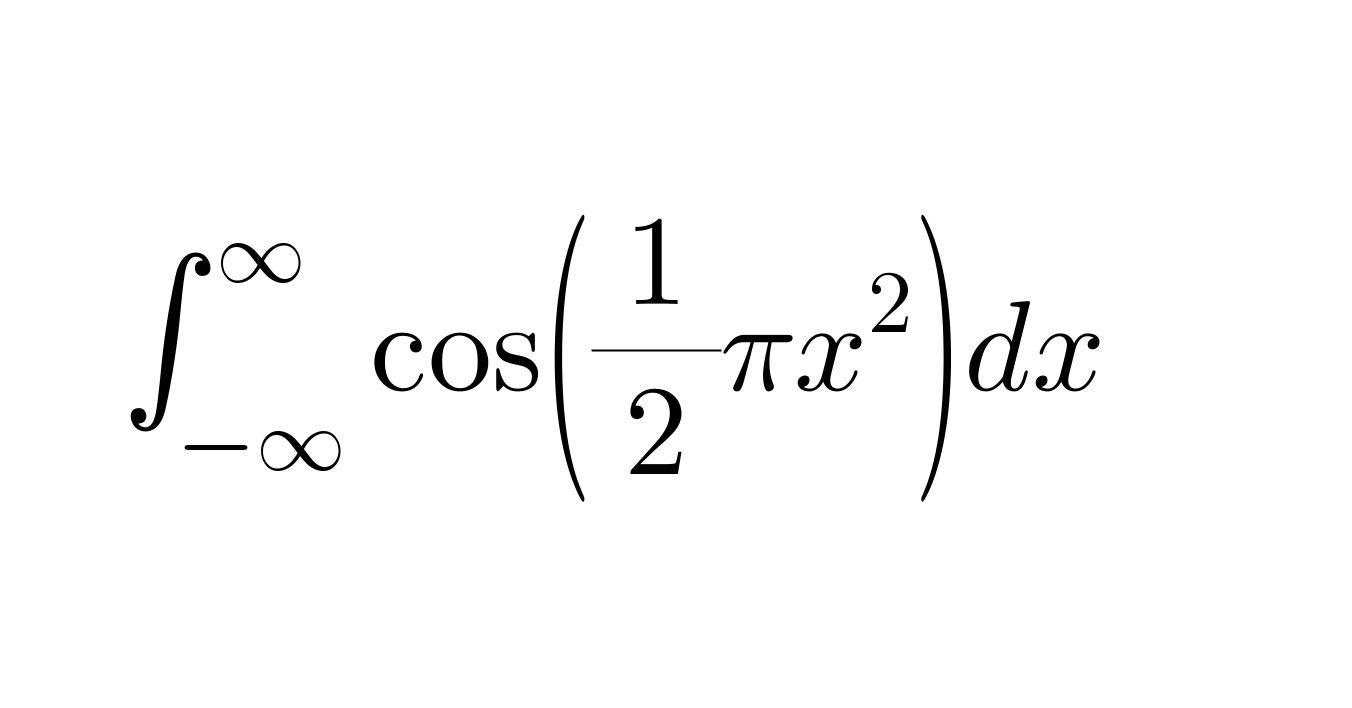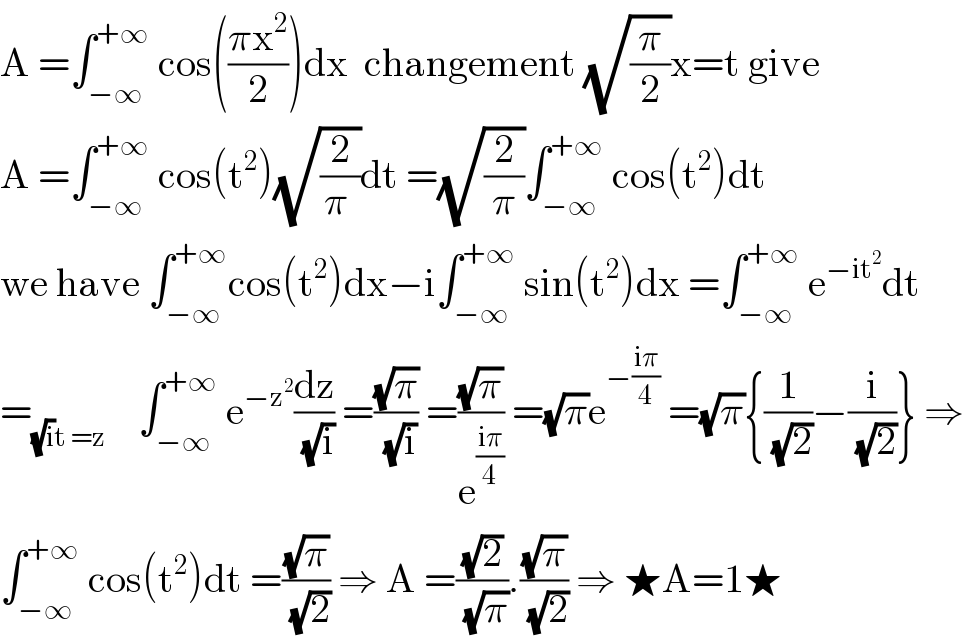Question Number 117438 by hatakekakashi1729gmailcom last updated on 11/Oct/20

$$ \\ $$$$\:\:\:\:\:\int_{−\infty} ^{\:\infty} \mathrm{cos}\left(\frac{\mathrm{1}}{\mathrm{2}}\pi{x}^{\mathrm{2}} \right){dx}\:\:\:\:\: \\ $$$$ \\ $$
Answered by AbduraufKodiriy last updated on 11/Oct/20

Answered by AbduraufKodiriy last updated on 11/Oct/20

$$\int_{−\infty} ^{\:\infty} \boldsymbol{{cos}}\left(\frac{\mathrm{1}}{\mathrm{2}}\pi\boldsymbol{{x}}^{\mathrm{2}} \right)\boldsymbol{{dx}}=\mathrm{2}\int_{\mathrm{0}} ^{\:\infty} \boldsymbol{{cos}}\left(\frac{\mathrm{1}}{\mathrm{2}}\pi\boldsymbol{{x}}^{\mathrm{2}} \right)\boldsymbol{{dx}}=\begin{vmatrix}{\sqrt{\frac{\pi}{\mathrm{2}}}\boldsymbol{{x}}=\boldsymbol{{u}}}\\{\boldsymbol{{dx}}=\sqrt{\frac{\mathrm{2}}{\pi}}\boldsymbol{{du}}}\end{vmatrix}= \\ $$$$=\mathrm{2}\sqrt{\frac{\mathrm{2}}{\pi}}\int_{\mathrm{0}} ^{\:\infty} \boldsymbol{{cos}}\left(\boldsymbol{{u}}^{\mathrm{2}} \right)\boldsymbol{{du}}=\mathrm{2}\sqrt{\frac{\mathrm{2}}{\pi}}\centerdot\sqrt{\frac{\pi}{\mathrm{8}}}=\mathrm{1} \\ $$
Answered by AbduraufKodiriy last updated on 11/Oct/20

Answered by mathmax by abdo last updated on 11/Oct/20

$$\mathrm{A}\:=\int_{−\infty} ^{+\infty} \:\mathrm{cos}\left(\frac{\pi\mathrm{x}^{\mathrm{2}} }{\mathrm{2}}\right)\mathrm{dx}\:\:\mathrm{changement}\:\sqrt{\frac{\pi}{\mathrm{2}}}\mathrm{x}=\mathrm{t}\:\mathrm{give} \\ $$$$\mathrm{A}\:=\int_{−\infty} ^{+\infty} \:\mathrm{cos}\left(\mathrm{t}^{\mathrm{2}} \right)\sqrt{\frac{\mathrm{2}}{\pi\:}}\mathrm{dt}\:=\sqrt{\frac{\mathrm{2}}{\pi}}\int_{−\infty} ^{+\infty} \:\mathrm{cos}\left(\mathrm{t}^{\mathrm{2}} \right)\mathrm{dt} \\ $$$$\mathrm{we}\:\mathrm{have}\:\int_{−\infty} ^{+\infty} \mathrm{cos}\left(\mathrm{t}^{\mathrm{2}} \right)\mathrm{dx}−\mathrm{i}\int_{−\infty} ^{+\infty} \:\mathrm{sin}\left(\mathrm{t}^{\mathrm{2}} \right)\mathrm{dx}\:=\int_{−\infty} ^{+\infty} \:\mathrm{e}^{−\mathrm{it}^{\mathrm{2}} } \mathrm{dt} \\ $$$$=_{\sqrt{\mathrm{i}}\mathrm{t}\:=\mathrm{z}} \:\:\:\:\int_{−\infty} ^{+\infty} \:\mathrm{e}^{−\mathrm{z}^{\mathrm{2}} } \frac{\mathrm{dz}}{\:\sqrt{\mathrm{i}}}\:=\frac{\sqrt{\pi}}{\:\sqrt{\mathrm{i}}}\:=\frac{\sqrt{\pi}}{\mathrm{e}^{\frac{\mathrm{i}\pi}{\mathrm{4}}} }\:=\sqrt{\pi}\mathrm{e}^{−\frac{\mathrm{i}\pi}{\mathrm{4}}} \:=\sqrt{\pi}\left\{\frac{\mathrm{1}}{\:\sqrt{\mathrm{2}}}−\frac{\mathrm{i}}{\:\sqrt{\mathrm{2}}}\right\}\:\Rightarrow \\ $$$$\int_{−\infty} ^{+\infty} \:\mathrm{cos}\left(\mathrm{t}^{\mathrm{2}} \right)\mathrm{dt}\:=\frac{\sqrt{\pi}}{\:\sqrt{\mathrm{2}}}\:\Rightarrow\:\mathrm{A}\:=\frac{\sqrt{\mathrm{2}}}{\:\sqrt{\pi}}.\frac{\sqrt{\pi}}{\:\sqrt{\mathrm{2}}}\:\Rightarrow\:\bigstar\mathrm{A}=\mathrm{1}\bigstar \\ $$
Commented by AbduraufKodiriy last updated on 11/Oct/20

$$\boldsymbol{{what}}\:\boldsymbol{{if}}\:\frac{\sqrt{\pi}}{\:\sqrt{\boldsymbol{{i}}}}\:\boldsymbol{{is}}\:\boldsymbol{{equals}}\:\boldsymbol{{to}}\:\frac{\sqrt{\pi}}{\boldsymbol{{e}}^{\frac{\mathrm{5}\boldsymbol{{i}}\pi}{\mathrm{4}}} }\:? \\ $$
Commented by Bird last updated on 12/Oct/20

$${we}\:{take}\:{the}\:{principal}\:{value}\:{of} \\ $$$${e}^{{z}} \:{and}\:{lnz}\:\:\left({principal}\:{determinatin}\right) \\ $$
